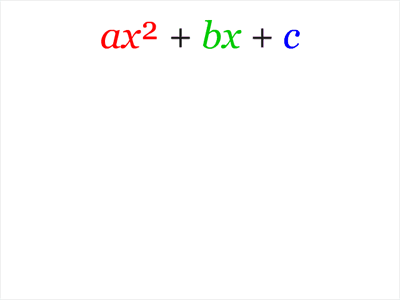Original post by thefatone
what does completing the square actually tell you?
i know can be used to
find the minimum point of a quadratic
to derive the quadratic formula
do c1 questions which require this skill
what uses does it have?
i know can be used to
find the minimum point of a quadratic
to derive the quadratic formula
do c1 questions which require this skill
what uses does it have?
Pretty much what you said. It's sort of an easier way to factorise a quadratic.
Original post by john_jomcy98
Pretty much what you said. It's sort of an easier way to factorise a quadratic.
i know but it doesn't give the fully factorised version/using the forumla
It's used in FP3 to turn things in to a different form that is easier to integrate
Original post by thefatone
Completing the square
I know that this isn't the directly related to the question but you might enjoy reading this post.
Original post by Zacken
I know that this isn't the directly related to the question but you might enjoy reading this post.
can you have quadratics with imaginary numbers?
Original post by Student403
It's used in FP3 to turn things in to a different form that is easier to integrate
Original post by B_9710
Can be used to solve quadratics more conveniently.
Manipulate expressions in integrands to make things easier to integrate.
Manipulate expressions in integrands to make things easier to integrate.
that's new.... da how i wish i did further maths now >.>
Original post by Zacken
I know that this isn't the directly related to the question but you might enjoy reading this post.
will do...
Original post by Youngmetro
can you have quadratics with imaginary numbers?
Yes. Do you mean as coefficients or factoring them over the complex plane? If it's the former: definitely, if it's the latter: still definitely. The complex number field acts as the algebraic extension or closure of the real number field, so you can definitely factorise a quadratic with real coefficients into two linear factors.
Original post by thefatone
what does completing the square actually tell you?
i know can be used to
find the minimum point of a quadratic
to derive the quadratic formula
do c1 questions which require this skill
what uses does it have?
i know can be used to
find the minimum point of a quadratic
to derive the quadratic formula
do c1 questions which require this skill
what uses does it have?
You have asked two different questions here, but I'll give an answer to the first: completing the square tells you that, given a rectangle, you can always find a square with a smaller square removed, with the same area as the rectangle. For example:
is the area of a rectangle of sides . But by competing the square, we have which is the area of a square of side with a smaller square, area removed.
You can see a graphical representation of this here: http://www.thestudentroom.co.uk/showpost.php?p=51716679&postcount=5
Original post by atsruser
You can see a graphical representation of this here:
You can see a graphical representation of this here:
Perhaps more complicated than needs be, but meh:

Original post by Zacken
Perhaps more complicated than needs be, but meh:


That's neat, but not very easy to follow, I think.
Original post by atsruser
That's neat, but not very easy to follow, I think.
Yeah, I agree - I much preferred your simpler and more concise example.
Original post by atsruser
You have asked two different questions here, but I'll give an answer to the first: completing the square tells you that, given a rectangle, you can always find a square with a smaller square removed, with the same area as the rectangle. For example:
is the area of a rectangle of sides . But by competing the square, we have which is the area of a square of side with a smaller square, area removed.
You can see a graphical representation of this here: http://www.thestudentroom.co.uk/showpost.php?p=51716679&postcount=5
is the area of a rectangle of sides . But by competing the square, we have which is the area of a square of side with a smaller square, area removed.
You can see a graphical representation of this here: http://www.thestudentroom.co.uk/showpost.php?p=51716679&postcount=5
Original post by Zacken
Perhaps more complicated than needs be, but meh:


thanks both of you, now i can understand why it's called completing the square xD
Quick Reply
Related discussions
- Mistake in the Edexcel practice book for Year 1/ AS Maths?
- help
- Maths help
- 2022 Edexcel Maths GCSE (Higher) Checklist
- Maths - GCSE
- Simple differentiation question
- Quadratics
- OCR GCSE Maths Paper 6 (Higher)
- Please help me with this question!!!
- Converting scale to feet
- Quadratic equations
- OCR 2023 A level maths pure and stats
- Hi can someone help with this maths question
- circle question help
- Replacement tenant wanted in London (Urbanest Tower Bridge)
- Mathswatch
- Hard GCSE Question
- Please help me understand?
- Bmo/smc ukmt
- Edexcel igcse maths topics
Latest
Posted 2 minutes ago
yet to receive a woodhouse interviewLast reply 4 minutes ago
So I made the worst decision of my life. I chose Biochemistry as my degree.Last reply 17 minutes ago
Zoom to Zoology? Uni open days, applications & more 2021-Present - a parents takePosted 25 minutes ago
What'll happen if a uni told me that my application is given to other schools?Last reply 30 minutes ago
Deloitte Graduate Scheme 2024Last reply 1 hour ago
Official London School of Economics and Political Science 2024 Applicant ThreadTrending
Last reply 1 week ago
Edexcel A Level Mathematics Paper 2 unofficial mark scheme correct me if wrongMaths
71
Trending
Last reply 1 week ago
Edexcel A Level Mathematics Paper 2 unofficial mark scheme correct me if wrongMaths
71




